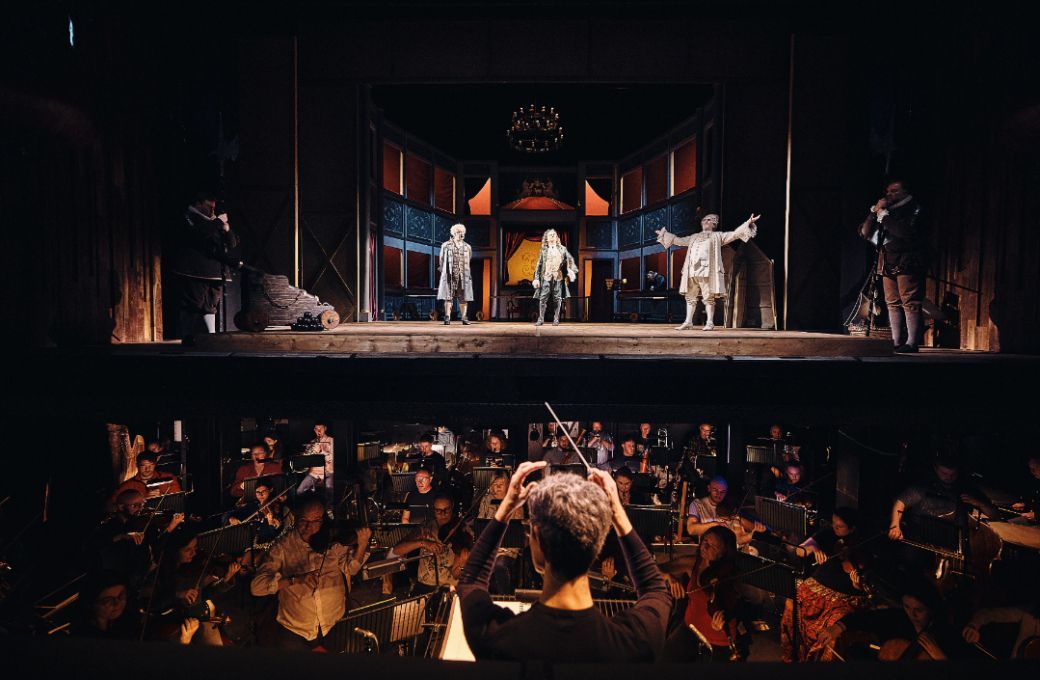Like many Bachtrack readers, every season you probably attend several live performances of classical music and opera – and occasionally you might enjoy the razzmatazz of a big musical, too. But has it occurred to you that some of the super-talented players you heard in the pit at, for example, Rigoletto, might also be the same players you heard a few days before in Fiddler on the Roof?

Welcome to the life of the freelance musician. Night after night in the West End of London, and in concert halls and theatres up and down the country, an unsung army of seasoned professionals is ensuring the show goes on, booked for their supreme ability to play well under fire.
What is life like for such stalwart instrumentalists? To find out more, I spoke to trumpeter Seb Philpott and cellist Verity Simmons, both versatile freelancers and products of London’s admired music colleges. They trained hard and work prodigiously – but perhaps not in a manner many audiences might expect.
Just before graduating from the Royal College of Music, Seb took his trumpet on a world tour with the rock band The Hoosiers. “I felt I became a man that year,” he laughs. “I was 21, and my trombonist brother, aged 19, came with me. We learnt quickly how that branch of the industry works.” On his return to London, in complete contrast, he found himself booked to play in the pit at the Royal Opera House, Covent Garden, for Wagner’s Tristan und Isolde under Sir Antonio Pappano.
“It was my first professional orchestral engagement and I loved it. Suddenly I had 10 rehearsals for six performances that lasted five hours each. That’s a huge booking. I remember that first night when we stood as Pappano arrived in the pit and I looked out across that vast auditorium and thought: ‘How am I here? This is amazing.’” He was asked back for other operas several times after that, but five years on there came a turning point. He was booked for a revival of Tristan but was also asked to play for the Sondheim musical Assassins over the river in Southwark, south London. So what to do? He decided to turn down the musical, but colleagues advised him to think carefully. At the Opera House he would be one of several trumpets in a large orchestra, they said. In Assassins he would be the only trumpet in a six-piece ensemble. He would have much more responsibility and a chance to help shape the sound as rehearsals progressed, working together to put on a show.
That really appealed to him, so, at the risk of annoying the Opera House fixer, he turned down Tristan and went to work on the musical, a decision he has never regretted. Besides working again at the Opera House and with English National Opera, the BBC Concert Orchestra, Royal Philharmonic Orchestra, the Philharmonia, London Contemporary Orchestra and the Orchestra of the Age of Enlightenment, Seb has since played for West End musicals Evita, Les Misérables, Matilda, Phantom of the Opera, Follies, Funny Girl, Bugsy Malone, On The Town, Crazy For You, Spirited Away and Sunset Boulevard.
He loves the flexibility of this life as it allows him daytime at home with his young family. (When we talked, his wife Charlotte Kerbegian, a freelance double-bassist, was on tour with the London Philharmonic Orchestra and he was in the middle of a fortnight of solo childcare.) He also puts in time in the recording studio he built in his garden. He enjoys the intricate nature of mixing tracks by Dirty Old Brasstards, a covers band he helped establish 12 years ago. “They are a great bunch of brass players. We’ve even played Glastonbury, though the first time we appeared there in 2013, Arctic Monkeys were on at the same time, so virtually no one came to see us!”
At the Guildhall, Verity Simmons enjoyed collaborating with other students in creative projects, and found she particularly enjoyed playing for college musicals. “I could see that some of my fellow students were going to be soloists, and others were keen to go into orchestras, but I’ve always revelled in doing new things. After I graduated I auditioned for Southbank Sinfonia and loved it. I worked with some great conductors, became principal cellist and appeared as soloist in the Saint-Saëns concerto. I was also playing in Charlie and the Chocolate Factory and A Little Night Music and had a call one night offering me the cello chair for Funny Girl at the Savoy. That changed the whole trajectory of my career.”
Like Seb, she can now list dozens of musicals in her CV, including Crazy for You, Big Fish, Evita, Frozen, An American in Paris, Les Misérables, West Side Story and Fiddler on the Roof. And while these occupy her evenings, her days might be spent rehearsing Mozart, Beethoven and Dvorak with the Regent String Quartet. She also plays in the Estilo String Quartet, established by her husband Robert (a member of Royal Ballet Sinfonia) when he was still at school. “We did 120 gigs in one year,” she laughs, “playing lighter music and pop covers at weddings and functions.”
Ever the versatile player, she spent three seasons travelling the country with English Touring Opera, and lists Kurt Weill’s The Silver Lake, Mozart’s Seraglio and Rossini’s Elisabetta, regina d’Inghilterra as particularly memorable productions.
Audience members at musicals sometimes ask how the orchestra can stand playing the same score eight times a week for months. “It can be hard going, both mentally and physically,” admits Verity. “Finding different focuses, such as listening to different sections of the band every night or trying out new fingerings or bowings can help. An excellent MD will try out new things to keeps it fresh, which is really helpful. Having excellent band mates and always wanting to play your best as a section is also important. When you are in a section with people you really value and rate it keeps you on your toes.”
In musicals or opera it’s also difficult for players to really get a sense of what’s going on up on the stage. As a brass player sitting at the back of the pit, Seb says there is a disconnect, unless a good conductor gives you a sense of the action. They both advise anyone in the pit to try to get to know the cast and feel involved. “The sitzprobe – the rehearsal when the cast hears the band for the first time – is a great opportunity to put faces to names and build that company feel,” says Seb.
They feel this approach enriches their experience. “Just turning up and playing the notes is not music,” Seb says. Verity agrees, and urges players to really think about their roles. “More often than not you will be playing a single part, and things can go awry, especially if you are there deputising for another player. You have to be well rehearsed, quick and flexible.” She’s proud of the reputation of UK musicians as really strong sight-readers. “My colleagues are so versatile. They can sight-read a film score – basically play anything.”
In orchestral work there is limited time for rehearsal, and when the clock is ticking, lengthy questions about the score are not welcome. “In the big orchestras you actually have to ask your question through your section principal,” says Seb. It’s a long way from the more collegiate approach taken in musicals.
Seb and Verity met while playing Funny Girl in 2016 and didn’t work together again until Evita at Regent’s Park Open Air Theatre in 2019. Verity, who is something of a wine expert, told Seb she was hoping to start a podcast on wine. “It won’t surprise you to learn that drinking wine and organising things don’t go well together, so it didn’t happen, but Seb and I got talking and decided a podcast focussing on musicians might be better.”
Five years on and Three in a Bar has become an institution for people in music, with 126 episodes covering informal conversations with musicians right across the profession. (Full disclosure: my son Jeremy, bassist with the band Everything Everything, has featured in their series.) “We’ve given up trying to make any money from it,” laughs Seb, “but we hope our fellow musicians find it useful and that audiences get a glimpse into the working lives of a great range of people.” And they have ambitions for the future. “We would love to do a live show in front of an audience where we could play the music of the person we are interviewing, and who knows, one day this could make a great radio show.”
In the meantime, it’s back to the pit. When we meet, Verity is heading to the Donmar Warehouse in Covent Garden to rehearse a new show, a theatre where Seb made his acting debut in When Winston Went to War with the Wireless. He played trumpet, portrayed the Speaker of the House, and devised some convincing radio sound effects. Next time you want the sound of a sword fight, just ask the versatile Seb. He’ll bring a spade and a bucket of gravel…


